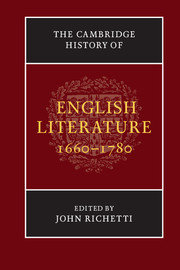Book contents
- Frontmatter
- Introduction
- PART I LITERARY PRODUCTION AND DISSEMINATION: CHANGING AUDIENCES AND EMERGING MEDIA
- PART II LITERARY GENRES: ADAPTATION AND REFORMATION
- 5 Restoration and early eighteenth-century drama
- 6 Dryden and the poetic career
- 7 Political, satirical, didactic and lyric poetry (I): from the Restoration to the death of Pope
- 8 Eighteenth-century women poets
- 9 Systems satire: Swift.com
- 10 Persistence, adaptations and transformations in pastoral and Georgic poetry
- 11 Political, satirical, didactic and lyric poetry (II): after Pope
- 12 Drama and theatre in the mid and later eighteenth century
- 13 Scottish poetry and regional literary expression
- PART III LITERATURE AND INTELLECTUAL LIFE: THE PRODUCTION AND TRANSMISSION OF CULTURE
- PART IV LITERATURE AND SOCIAL AND INSTITUTIONAL CHANGE
- PART V LITERARY GENRES: TRANSFORMATION AND NEW FORMS OF EXPRESSIVENESS
- PART VI CONCLUSION
- Chronology
- Bibliographies
- Index
- References
7 - Political, satirical, didactic and lyric poetry (I): from the Restoration to the death of Pope
from PART II - LITERARY GENRES: ADAPTATION AND REFORMATION
Published online by Cambridge University Press: 28 March 2008
- Frontmatter
- Introduction
- PART I LITERARY PRODUCTION AND DISSEMINATION: CHANGING AUDIENCES AND EMERGING MEDIA
- PART II LITERARY GENRES: ADAPTATION AND REFORMATION
- 5 Restoration and early eighteenth-century drama
- 6 Dryden and the poetic career
- 7 Political, satirical, didactic and lyric poetry (I): from the Restoration to the death of Pope
- 8 Eighteenth-century women poets
- 9 Systems satire: Swift.com
- 10 Persistence, adaptations and transformations in pastoral and Georgic poetry
- 11 Political, satirical, didactic and lyric poetry (II): after Pope
- 12 Drama and theatre in the mid and later eighteenth century
- 13 Scottish poetry and regional literary expression
- PART III LITERATURE AND INTELLECTUAL LIFE: THE PRODUCTION AND TRANSMISSION OF CULTURE
- PART IV LITERATURE AND SOCIAL AND INSTITUTIONAL CHANGE
- PART V LITERARY GENRES: TRANSFORMATION AND NEW FORMS OF EXPRESSIVENESS
- PART VI CONCLUSION
- Chronology
- Bibliographies
- Index
- References
Summary
Literary history has not been kind to British poetry of the late seventeenth and eighteenth century, far preferring poems of the periods just before and after. The reasons are many, having at least as much to do with subsequent patterns of taste as with the poetry itself. But the poetry does have features that make it seem especially difficult or odd to readers of later times, especially those with post-romantic ideas of what poetry is or should be. Despite Romantic claims to have reformed poetry along democratic lines (claims that did open up important new topics and directions, but that also ultimately narrowed what was considered ‘poetic’), poetry before the Romantics was open to wider uses and was more varied in topic and tone. Poetry then was more inclusive in several ways: treated a greater variety of subjects, used a larger range of voices and styles, aspired to more cultural uses and aimed at more diverse, less self-chosen audiences. As Joseph Trapp (Professor of Poetry at Oxford University) observed in a series of early eighteenth-century lectures, poetry's scope properly involved ‘every Being in Nature, and every object of the Imagination’.
Poetry regularly invaded all forms of discourse and performed many kinds of services later restricted to prose: philosophical argument, for example, and didactic and utilitarian guides for ordinary life and activity. No subject was considered truly unpoetic; the range was from panegyric to invective and from delicacy and admiration to horror and gross disgust, from raucous and bawdy comedy to solemn high-mindedness.
- Type
- Chapter
- Information
- The Cambridge History of English Literature, 1660–1780 , pp. 160 - 208Publisher: Cambridge University PressPrint publication year: 2005
References
- 1
- Cited by

